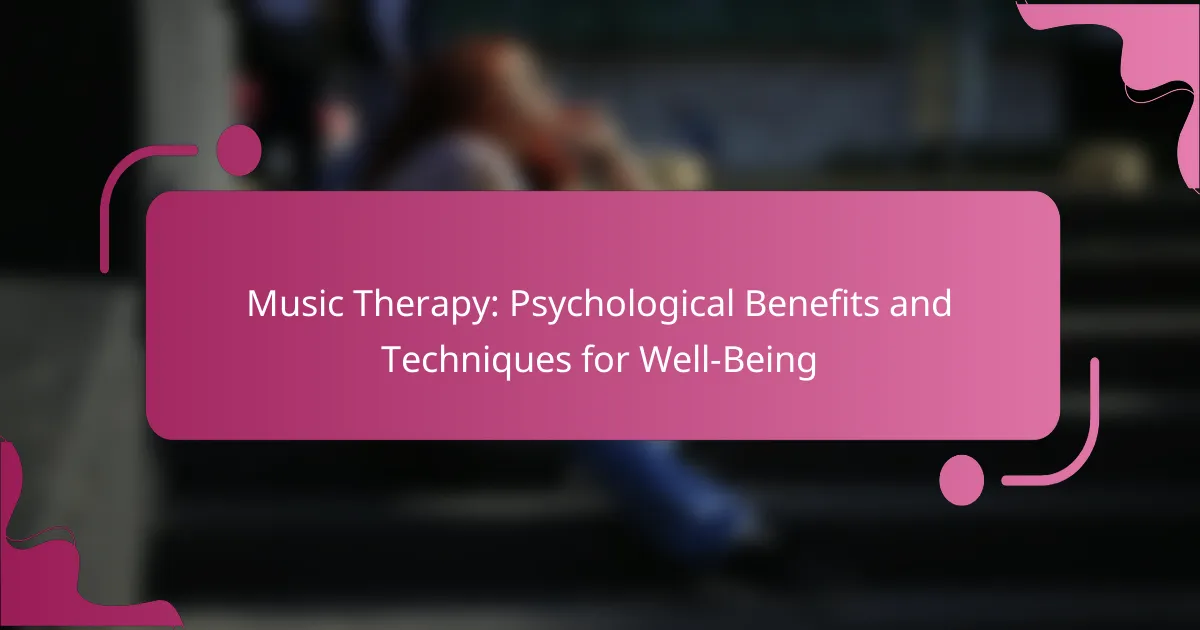Music therapy offers significant psychological benefits, including reduced anxiety and improved mood. This article explores various techniques like songwriting and improvisation that enhance emotional expression and self-awareness. Research supports its effectiveness in mental health treatment, highlighting its role in fostering social connections. Challenges faced by therapists and future trends in personalized approaches and technology integration will also be discussed.
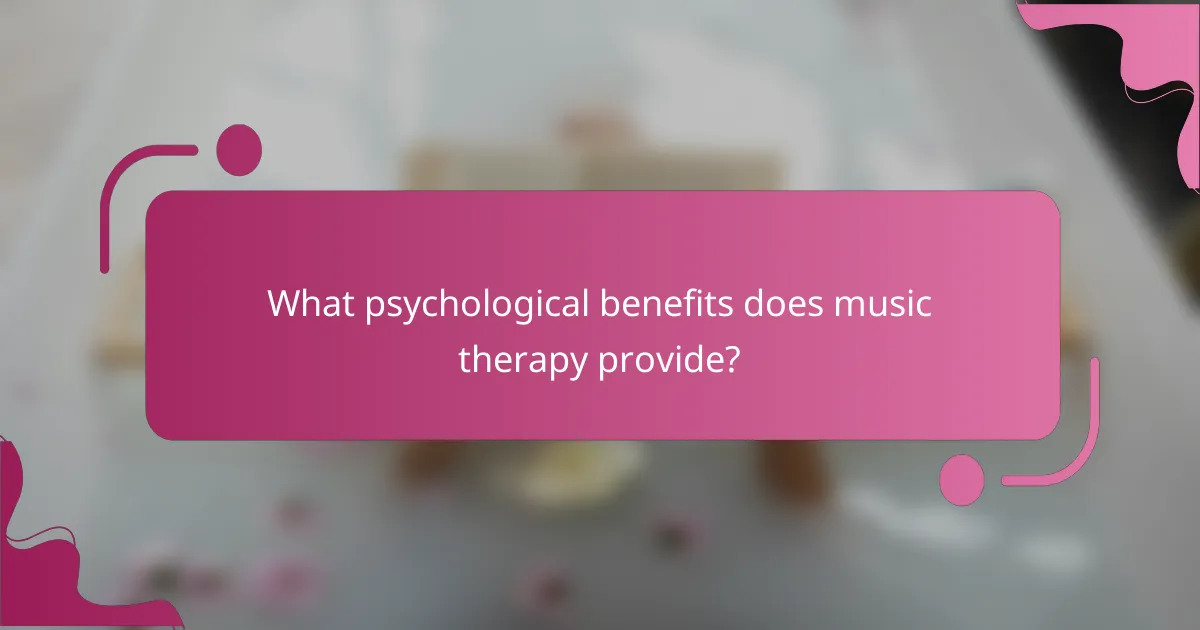
What psychological benefits does music therapy provide?
Music therapy provides significant psychological benefits, including reduced anxiety, improved mood, and enhanced emotional expression. It can facilitate social connections and foster a sense of belonging. Techniques such as songwriting, improvisation, and active listening promote self-awareness and coping strategies. Research shows that music therapy can lead to measurable improvements in mental health, demonstrating its effectiveness in therapeutic settings.
How does music therapy reduce anxiety and stress?
Music therapy effectively reduces anxiety and stress by utilizing sound and rhythm to promote relaxation and emotional expression. Techniques include guided imagery, active music-making, and listening to calming music. Research shows that music therapy can lower cortisol levels, which are linked to stress. Additionally, it enhances mood and fosters a sense of connection, contributing to overall well-being.
In what ways can music therapy improve mood and emotional regulation?
Music therapy can significantly enhance mood and emotional regulation through various techniques. It promotes relaxation, reduces anxiety, and fosters emotional expression. Engaging with music can trigger positive memories and feelings, leading to improved mental well-being. Techniques such as songwriting, improvisation, and listening can help individuals process emotions and develop coping strategies. Studies indicate that music therapy can lower cortisol levels, contributing to reduced stress and improved emotional stability.
Which populations benefit most from music therapy interventions?
Individuals with mental health disorders, developmental disabilities, and chronic pain benefit most from music therapy interventions. Research shows that music therapy reduces anxiety, enhances emotional expression, and improves overall well-being. Populations such as children with autism, elderly individuals with dementia, and patients undergoing rehabilitation often experience significant psychological and emotional gains through tailored music therapy techniques. These interventions foster connection, promote relaxation, and encourage social interaction, ultimately enhancing quality of life.
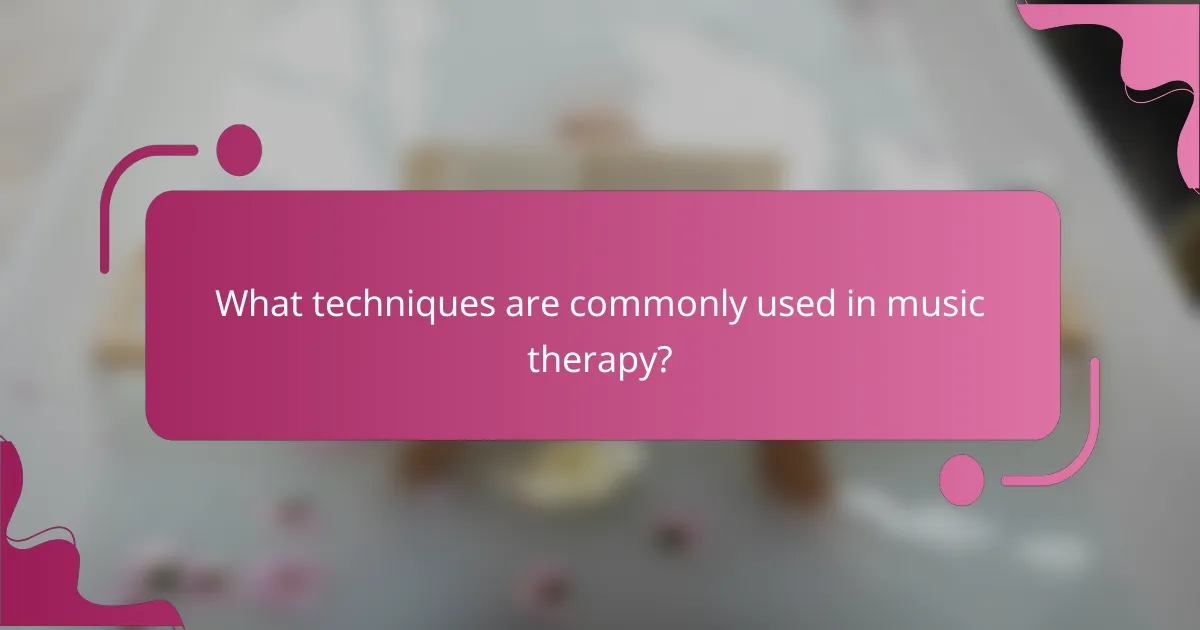
What techniques are commonly used in music therapy?
Common techniques in music therapy include improvisation, songwriting, lyric analysis, and active listening. These methods help individuals express emotions, improve communication, and enhance overall well-being. For example, improvisation allows clients to create music spontaneously, fostering creativity and self-discovery. Songwriting encourages personal reflection and emotional processing, while lyric analysis promotes discussion and insight into feelings. Active listening provides a supportive environment, validating experiences and facilitating healing. Each technique addresses unique psychological needs, making music therapy a versatile approach to mental health care.
How do improvisation and songwriting facilitate healing?
Improvisation and songwriting promote healing by enhancing emotional expression and fostering connection. These techniques in music therapy facilitate self-discovery and emotional processing. Participants often report reduced anxiety and improved mood. Engaging in music-making can also build social bonds, which further supports psychological well-being.
What role does active music-making play in therapy sessions?
Active music-making is crucial in therapy sessions as it enhances emotional expression and promotes mental well-being. Engaging in music facilitates communication, especially for individuals who struggle with verbal expression. It fosters a sense of connection, allowing participants to explore feelings and experiences in a supportive environment.
Research indicates that active music-making can reduce anxiety and depression, improving overall mood. Techniques such as improvisation and songwriting enable clients to articulate emotions and experiences creatively. This process can lead to increased self-awareness and personal insight, contributing to therapeutic progress.
Moreover, music therapy sessions often incorporate collaborative music-making, which builds social skills and enhances interpersonal relationships. This collaborative aspect can be especially beneficial for individuals with social anxiety or those recovering from trauma.
In summary, active music-making plays a vital role in therapy by promoting emotional expression, reducing anxiety, and fostering social connections.
Which listening techniques are effective for therapeutic outcomes?
Active listening, improvisation, and guided imagery are effective techniques in music therapy that enhance therapeutic outcomes. Active listening fosters emotional connection and understanding, while improvisation encourages self-expression and creativity. Guided imagery using music helps clients visualize positive scenarios, promoting relaxation and emotional healing. These techniques support psychological well-being by addressing individual needs and facilitating personal growth.
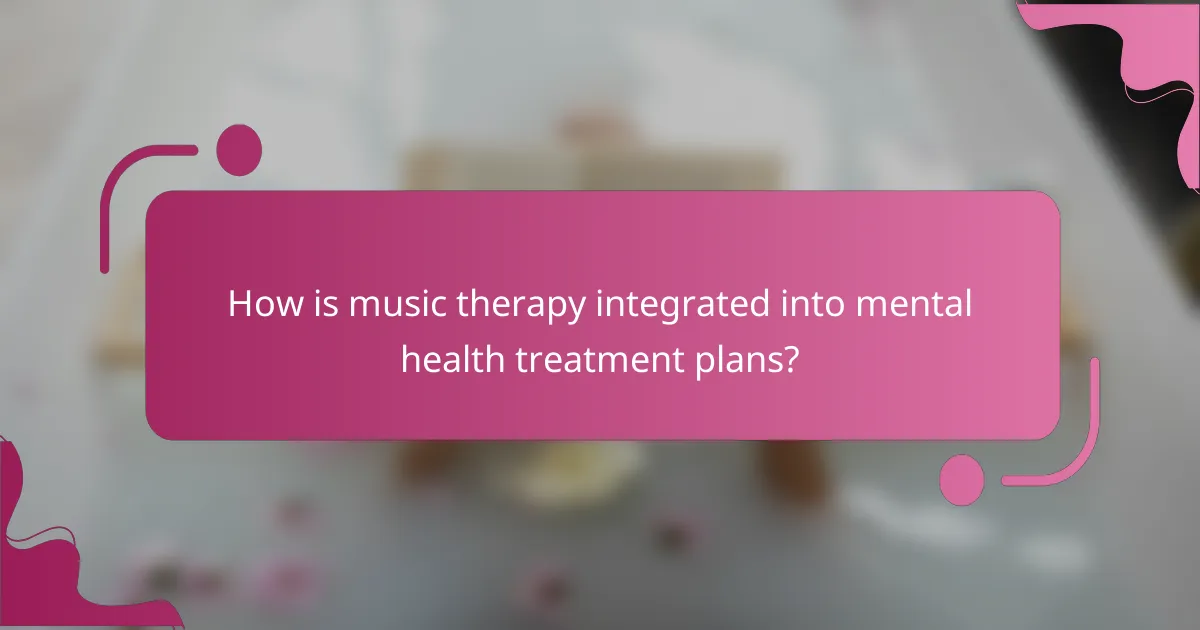
How is music therapy integrated into mental health treatment plans?
Music therapy is integrated into mental health treatment plans by using musical interventions to address emotional, cognitive, and social needs. Techniques include songwriting, improvisation, and active music-making, which enhance self-expression and emotional processing. Research shows that music therapy can reduce anxiety and improve mood, making it a valuable component of holistic treatment strategies. Additionally, it fosters social connections and enhances communication skills, particularly in individuals with social anxiety or autism spectrum disorders.
What are the collaborative practices between music therapists and other healthcare professionals?
Music therapists collaborate with healthcare professionals to enhance patient care through integrated treatment plans. These collaborations often involve sharing insights on patient progress, co-developing therapeutic goals, and utilizing complementary techniques. For example, music therapists may work with psychologists to address emotional issues or with occupational therapists to improve motor skills through music-based activities. This interdisciplinary approach fosters a holistic understanding of patient needs and promotes overall well-being. Research indicates that such collaborations can lead to improved patient outcomes and satisfaction.
How can music therapy be adapted for different cultural contexts?
Music therapy can be effectively adapted for different cultural contexts by considering cultural values, musical traditions, and community needs. Tailoring interventions to align with local customs enhances engagement and therapeutic outcomes. For instance, incorporating indigenous instruments or familiar melodies can foster a sense of belonging and comfort. Additionally, understanding the cultural significance of music in various societies allows therapists to create meaningful connections. This approach respects diverse perspectives and promotes inclusivity in therapeutic practices. Ultimately, cultural adaptation in music therapy enriches the experience, making it more relevant and impactful for individuals from varied backgrounds.
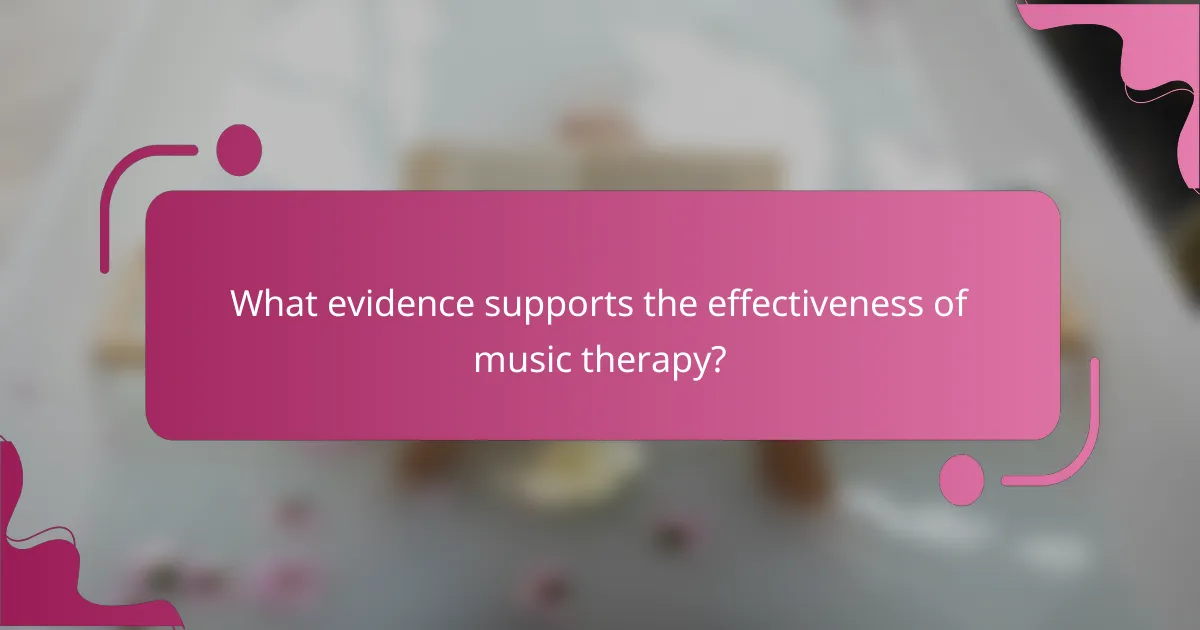
What evidence supports the effectiveness of music therapy?
Music therapy has demonstrated significant psychological benefits supported by various studies. Research indicates that music therapy reduces anxiety and depression, enhances mood, and improves cognitive function. For example, a meta-analysis showed that music therapy significantly decreased anxiety levels in patients undergoing medical treatments. Additionally, studies have found that active music engagement can lead to improved emotional expression and social interaction, particularly in individuals with autism spectrum disorder. These findings underscore music therapy’s effectiveness as a complementary treatment for mental health and well-being.
Which studies highlight the impact of music therapy on mental health?
Several studies demonstrate the positive impact of music therapy on mental health. Research indicates that music therapy can reduce symptoms of anxiety and depression, improve emotional regulation, and enhance overall well-being. For instance, a meta-analysis found that music therapy significantly decreases anxiety levels in various populations, including those with mental health disorders. Another study highlighted that individuals with depression showed notable improvements in mood and social interaction after participating in music therapy sessions. Additionally, music therapy has been effective in reducing stress and promoting relaxation, contributing to better mental health outcomes.
How do patient testimonials contribute to the understanding of music therapy’s benefits?
Patient testimonials significantly enhance the understanding of music therapy’s benefits by providing real-life experiences. They illustrate how individuals perceive improvements in mental health, emotional regulation, and overall well-being through music therapy. Testimonials often highlight unique attributes, such as increased self-expression and reduced anxiety, which are not always captured in clinical studies. As a result, these personal accounts can motivate others to explore music therapy as a viable treatment option, reinforcing its psychological benefits.
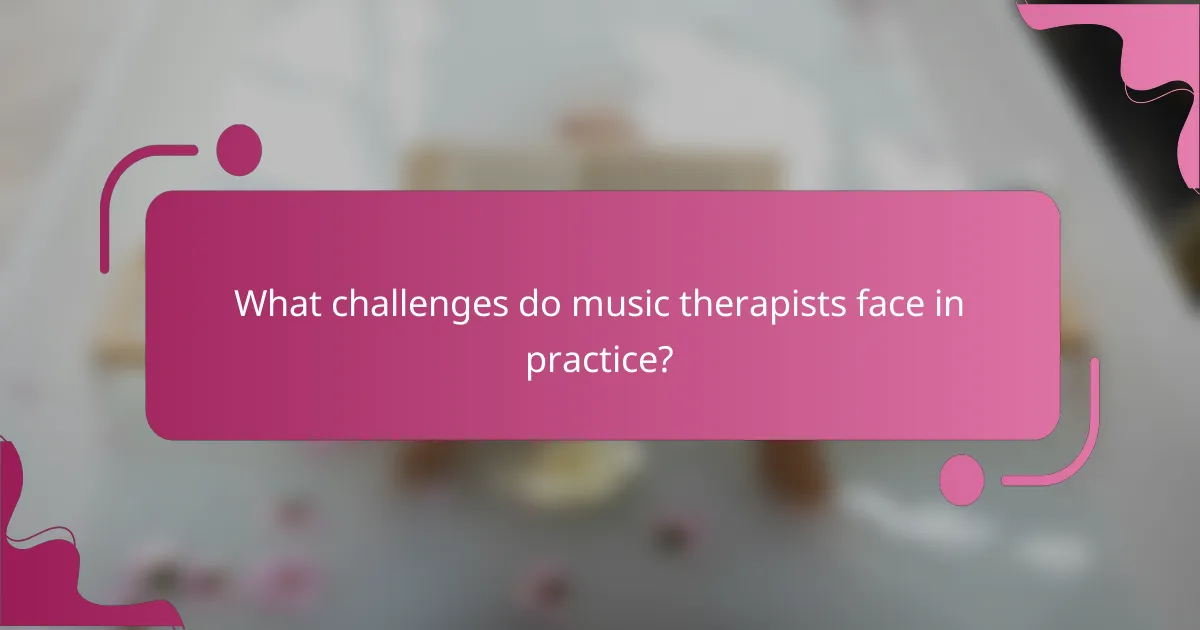
What challenges do music therapists face in practice?
Music therapists face various challenges in practice, including limited resources and varying client needs. They often encounter difficulties in measuring outcomes and demonstrating effectiveness. Additionally, therapists may struggle with interdisciplinary collaboration and managing emotional stress. These factors can hinder the delivery of optimal care and limit the accessibility of music therapy services.
How can therapists overcome resistance from clients?
Therapists can overcome client resistance in music therapy by fostering a safe environment and using engaging techniques. Establishing trust is crucial; clients are more likely to open up when they feel secure. Active listening and validating emotions can enhance this trust.
Incorporating personalized music selections can also motivate clients. Tailoring sessions to individual preferences increases engagement and reduces resistance. Techniques such as improvisation and songwriting empower clients, allowing them to express feelings creatively.
Utilizing rhythmic activities can facilitate emotional release and connection. These interactive experiences often lower defenses and encourage participation. Additionally, therapists should remain patient and flexible, adjusting approaches based on client responses to build rapport effectively.
Ultimately, the blend of empathy, creativity, and adaptability in music therapy can significantly reduce client resistance, promoting a more effective therapeutic process.
What are the common misconceptions about music therapy?
Many believe music therapy is merely listening to music, but it involves structured techniques for emotional and psychological healing. Common misconceptions include viewing it as entertainment rather than a therapeutic approach, assuming it is only for those with mental illness, and thinking it lacks scientific backing. In reality, music therapy employs evidence-based methods to enhance well-being and is effective for various populations, including those with chronic pain, stress, and developmental disorders. Additionally, some think it requires musical talent, but participation is beneficial regardless of skill level.

What are the future trends in music therapy?
Future trends in music therapy focus on personalized approaches, technology integration, and evidence-based practices. Personalized therapy will cater to individual needs, enhancing effectiveness. Technology will facilitate remote sessions and use apps for tracking progress. Research will continue to validate music therapy’s psychological benefits, leading to wider acceptance in clinical settings. Additionally, interdisciplinary collaboration will enrich therapy techniques, merging insights from psychology, neuroscience, and musicology.
How is technology reshaping music therapy practices?
Technology is transforming music therapy by enhancing accessibility, personalization, and effectiveness. Digital platforms facilitate remote sessions, allowing therapists to reach clients regardless of location. Advanced software enables tailored playlists based on individual preferences, optimizing therapeutic outcomes. Additionally, wearable devices track physiological responses, providing real-time feedback to therapists. This integration of technology fosters innovative techniques that improve mental well-being and engagement in music therapy practices.
What innovations are emerging in music therapy techniques?
Innovations in music therapy techniques include the use of technology, such as virtual reality and apps, to enhance therapeutic experiences. These advancements allow for personalized sessions that adapt to individual needs. For example, interactive music-making fosters engagement and emotional expression. Additionally, research into the neurobiological effects of music continues to inform new methods, improving outcomes for mental health and well-being. As a result, music therapy is evolving to incorporate diverse modalities and approaches that cater to various populations.
Which areas of research are gaining traction in music therapy?
Research areas gaining traction in music therapy include neuroplasticity, trauma recovery, and mental health interventions. Neuroplasticity studies focus on how music therapy can reshape brain function and enhance cognitive abilities. Trauma recovery research explores music’s role in processing emotional trauma and fostering resilience. Mental health interventions examine the effectiveness of music therapy in treating anxiety, depression, and stress-related disorders. Each area highlights music therapy’s potential to improve well-being and psychological health.
What are the best practices for maximizing the effectiveness of music therapy sessions?
To maximize the effectiveness of music therapy sessions, focus on personalized approaches and active engagement. Tailor sessions to individual needs, preferences, and therapeutic goals. Regularly assess progress and adapt techniques accordingly. Incorporate diverse musical styles to enhance emotional connection and expression. Create a safe, supportive environment that encourages participation and openness. Establish clear objectives for each session to guide the therapeutic process.
